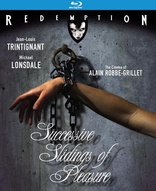Successive Slidings of Pleasure Blu-ray Movie
HomeSuccessive Slidings of Pleasure Blu-ray Movie 
Glissements progressifs du plaisirRedemption | 1974 | 106 min | Not rated | Feb 11, 2014
Movie rating
6.7 | / 10 |
Blu-ray rating
| Users | 0.0 | |
| Reviewer | 3.5 | |
| Overall | 3.5 |
Overview
Successive Slidings of Pleasure (1974)
A young woman is interrogated by the police and the judges at her trial, suspected of being a modern witch. The girl who shared her apartment has been found dead, bound to the posts of her bed, a pair of scissors impaled in her heart. Does the woman have the power to make all around her fall prey to her spell, forcing them to slide progressively into desire, lust and, ultimately, the unknown?
Starring: Olga Georges-Picot, Michael Lonsdale, Jean Martin (I), Jean-Louis Trintignant, Anicée AlvinaDirector: Alain Robbe-Grillet
| Foreign | Uncertain |
| Horror | Uncertain |
Specifications
Video
Video codec: MPEG-4 AVC
Video resolution: 1080p
Aspect ratio: 1.67:1
Original aspect ratio: 1.66:1
Audio
French: LPCM 2.0
Subtitles
English
Discs
50GB Blu-ray Disc
Single disc (1 BD)
Playback
Region A (B, C untested)
Review
Rating summary
| Movie | 3.5 | |
| Video | 4.0 | |
| Audio | 4.0 | |
| Extras | 3.0 | |
| Overall | 3.5 |
Successive Slidings of Pleasure Blu-ray Movie Review
The Seductive, Circular Cinema of Alain Robbe-Grillet
Reviewed by Casey Broadwater February 20, 2014More often associated with literature than with cinema, Alain Robbe-Grillet nonetheless made his mark on both, with fractured, circular, and/or self-
reflexive non-narratives that consciously pushed against what was expected of the two mediums. In the mid-1950s, his novels Le Voyeur and
La Jalousie established him as a key figure in the development of the Nouveau Roman (New Novel), a movement, caught in the gray
area between modernism and postmodernism, that attempted to do for fiction what the imminent Nouvelle Vague (New Wave) would do for
film—unhinge itself from the bourgeois "tradition of quality"-type storytelling of the 19th and early 20th centuries. "Plot" and "character" would no
longer be givens, and meta or non-linear narratives, along with other experimental forms, took the place of "straight" stories.
A key difference between the New Novelists and the New Wavers, however, was the role of authorial intent. While the former group sought to excise
the personal from their work, the latter placed an importance on directorial style and outlook and authority, which the critic-filmmakers at Cahiers
du Cinéma dubbed "auteur theory." For as much as Robbe-Grillet downplayed his own individual creative function in his novels—he once wrote,
“They are saying that the writer has a worldview, a sort of truth that he wishes to communicate, and that his writing has an ulterior significance. I am
against this”—when it comes to cinema, he is unreservedly an auteurist, with a vision and peculiarities that are all his own.
In his screenwriting debut, 1961's cryptic Last Year at Marienbad, he's credited as "co-auteur" with director Alain Resnais, and on the basis of
that film's success—it was nominated for that year's "Original Screenplay" Oscar and won the Golden Lion at the Venice Film Festival—he launched his
own directorial career, characterized by a defiantly kinky eroticism and oblique, inverted takes on the murder mystery and detective genres. His films
were never as successful as those of his New Wave contemporaries, and historically, they've been hard to track down on home video in the U.S., where
they've never officially been released. That changes this year, however, as Kino-Lorber—under their Redemption Films label—are releasing six of Robbe-
Grillet's films, starting this month with Trans-Europ-Express and Successive Slidings of Pleasure.
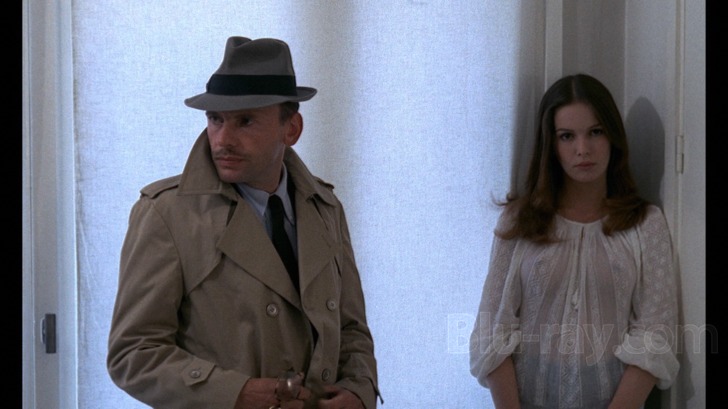
Read that last title again: Successive Slidings of Pleasure. It’s even more sexual-sounding in the original French: Glissements progressifs du plaisir. And the film, made in 1974, is certainly all about sex, particularly sexual power—submissiveness and dominance, masochism and sadism, patriarchy and male-gaze and the inversions thereof. Robbe-Grillet was a noted sadist himself—after his death, his submissive wife, Catherine, became France’s most famous dominatrix, turning the S&M tables so to speak—and some manner of kink figures prominently in most of his work, typically with men wielding the control. Here, though, a female sadist uses her sexual wiles to influence and confuse a series of men who would normally be seen as authority figures.
After a rapid-fire montage of a credit sequence, which essentially shows the entire film, chopped up and broken and rearranged into split-second moments, Successive Slidings opens with two occasional call-girls—our nameless protagonist (Anicée Alvina, credited as “The Prisoner”) and her roommate, Nora (The Day of the Jackal's Olga Georges-Picot)—who have some kind of asymmetrical sexual relationship of their own. Nora seems to be the willing subject of her roommate’s kinky whims. We see “The Prisoner” dressing her like a mannequin, and we watch as she paints red circles around Nora’s breasts as Nora is chained naked to a bed. If Nora’s blank expression seems doll-like and dead-eyed here, it’s because—as we soon find out—she is dead, stabbed through the ribs with a pair of scissors. A walking stereotype of a detective (Trans-Europ-Express’ Jean- Louis Trintignant) arrives to investigate the scene, but The Prisoner—let’s just call her Alvina from now on—plays coy, flirts with him, and claims that “Someone came, someone else was here.”
Awaiting trial, Alvina is locked away in a private religious prison operated by nuns, where she continues to manipulate the men who would seek to punish her (and confound the chaste women who run the joint). She discovers that the judge overseeing her case (Michael Londsdale) has a foot fetish and slowly drives him mad. She teases her priest (Jean Martin) into sweaty fits with non-apologetic confessions of fleshly sins. She strips naked in her cell, daubs herself with bright red paint, and presses her body against the walls, reenacting Yves Klein’s famous performance art piece. The story takes two even stranger turns when 1.) insinuations of witchcraft arise—there’s definitely a seamy, orgiastic nunsploitation vibe here—and when 2.) Alvina’s lawyer finally shows up, looking identical to the dead Nora. Weirder still, when the lawyer takes Alvina back to the scene of the crime for a pre-trial reenactment, the film gets stuck in a narrative time loop, the story appearing to repeat endlessly. (“Then we have to start all over again,” says the detective.)
With dense symbolism (which would seem to contradict the New Novelists’ aversion to metaphor) and disjointed flashbacks—look out for a young Isabelle Huppert in one quick scene—Successive Slidings of Pleasure is a sensory overload that doesn’t always make immediate sense. What do we make of the scene where the judge enters Alvina’s cell to find her listening to a phonograph simultaneously blaring dog barks and sexual moans? What’s the deal with the gravedigger who finds a blue shoe we previously saw propped up as a fetish inside a glass jar in Alvina’s apartment? What’s the significance of the repeated imagery of broken bottles and cracked eggs? It’s not unusual for 1970s euro-arthouse fare to practically demand repeat viewings, but Successive Slidings of Pleasure is bizarre in that each successive viewing slides effortlessly—pleasurably—into the next.
Successive Slidings of Pleasure Blu-ray Movie, Video Quality 
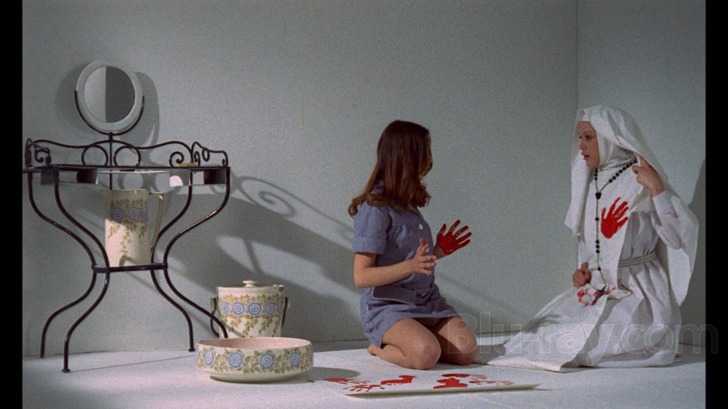
Making its home video debut in the U.S., Successive Slidings of Pleasures—remastered in high definition using original 35mm materials—looks excellent. Kino-Lorber's "as-is" approach to their transfers can be hit or miss depending on the source prints/negatives they have access to, but in this case, there are no substantial distractions. Print damage, when it does show up—which is rarely—is extremely light, consisting of a few flecks and brief scratches. Nothing heavy, nothing pervasive, nothing harsh or ugly. The film's 1080p/AVC-encoded transfer looks clean and filmic and natural, with visible grain and no evidence of digital noise reduction or edge enhancement. Colors are vivid and stable—and this is an all-around vivid film, color-wise—and contrast is neither too pronounced nor too flat. Overall clarity is also impressive; this was a low-budget film shot quickly in sixteen days, but focus is fairly consistent—it helps that Robbe-Grillet seemed to prefer deep depth of field—and there's plenty of fine detail, especially in closeups.
Successive Slidings of Pleasure Blu-ray Movie, Audio Quality 
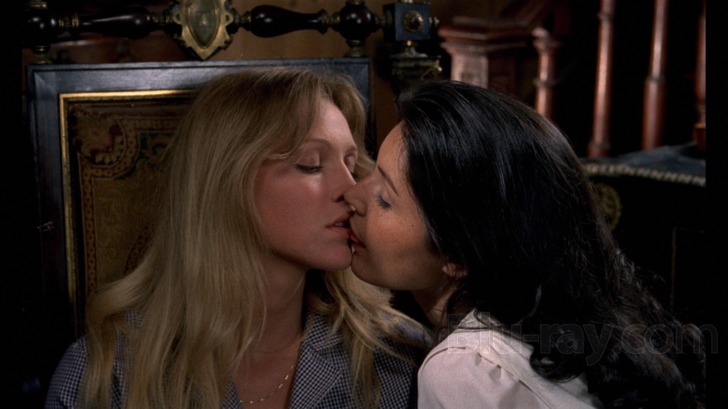
Likewise, there are no issues with the film's uncompressed Linear PCM 2.0 track, which is clear and stable throughout, with none of the crackling, peaking, or hisses that you often expect from films of this budget and era. Dialogue is pronounced in the mix, the sometimes experimental sound design is nicely reproduced, and Michel Fano's score sounds great. The disc features optional English subtitles, which appear in easy-to-read white lettering.
Successive Slidings of Pleasure Blu-ray Movie, Special Features and Extras 
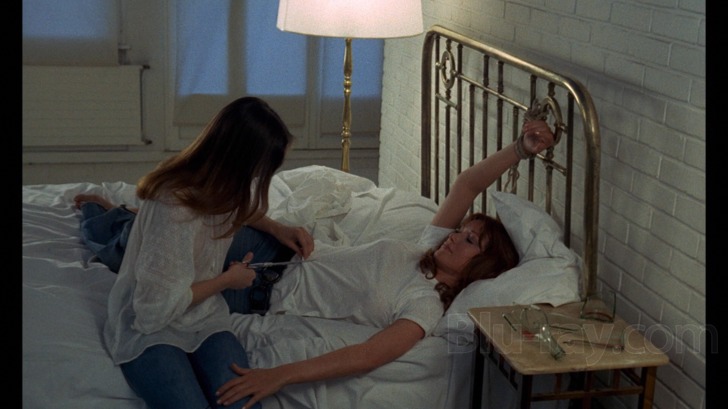
- Alain Robbe-Grillet Interview (HD, 34:09): In an interview with Frédéric Taddeï, Robbe-Grillet discusses making the film in 16 days, shooting inside the same dungeon where the Marquis de Sade was once imprisoned, and the influence of performance artist Yves Klein. In French, with English subtitles.
- Trailers: Includes high definition trailers for Trans-Europ-Express, The Man Who Lies, and Eden and After.
- 2014 Promo (HD, 2:09): A promotional trailer for Redemption's "The Cinema of Alain Robbe-Grillet" collection, with clips from all six films.
Successive Slidings of Pleasure Blu-ray Movie, Overall Score and Recommendation 
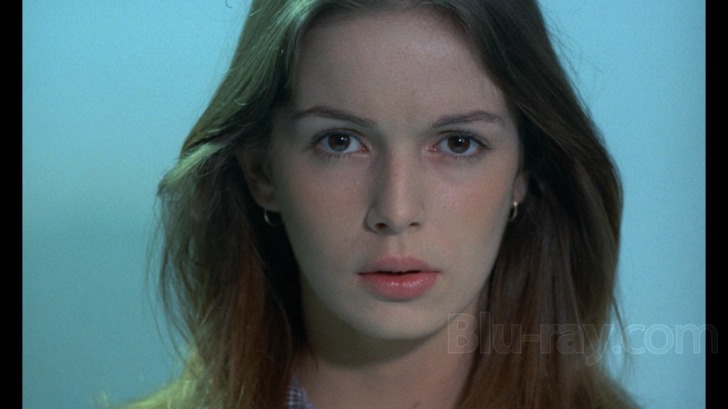
Circular stories can seem gimmicky today—after the time loops of Donnie Darko, 12 Monkeys, and Groundhog Day—but at the time, Successive Sliding's successive sliding from end to beginning and back again was a novel narrative experiment. This is an unusual film, not just in the construction of its story, but also in the way that it's highbrow and lowbrow simultaneously, wedding literary pretensions with 1970s euro- sleaze exploitation. And this is precisely why Alain Robbe-Grillet's films are worth exploring, and why Kino has opted to release them on the Redemption Films label, which specializes in the cultish and kinky. Recommended for S's & M's, nunsploitation fiends, and all fans of European cinema's independant outliers.
Similar titles
Similar titles you might also like

Trans-Europ Express
1967

N. a pris les dés...
N. Took the Dice
1971

Eden and After
L'éden et après
1970

The Man Who Lies
L'homme qui ment / L'uomo che mente
1968

L' Immortelle
The Immortal One
1963

Lust of the Vampire
I vampiri
1957

Rampo Noir
乱歩地獄 | Ranpo jigoku | Limited Edition
2005

Horrors of Malformed Men
江戸川乱歩全集 恐怖奇形人間 / Edogawa Rampo zenshû: Kyôfu kikei ningen
1969

Creature with the Blue Hand
Die Blaue Hand
1967

Bewitched
Gu / 蠱
1981

Death Smiles on a Murderer
La morte ha sorriso all'assassino
1973

The Bloodstained Butterfly
Una farfalla con le ali insanguinate
1971

Enigma Rosso
Virgin Killer / Red Rings of Fear / Orgie des Todes
1978

Cure
キュア / Kyua
1997

Luz
2018

Deep Red 4K
Profondo rosso
1975

The Howl of the Devil
Standard Edition | El Aullido del Diablo
1988

La bambola di Satana
The Doll of Satan | Limited Edition to 3000
1969

Tenebrae 4K
Standard Edition
1982

Nosferatu the Vampyre 4K
Nosferatu: Phantom der Nacht
1979
